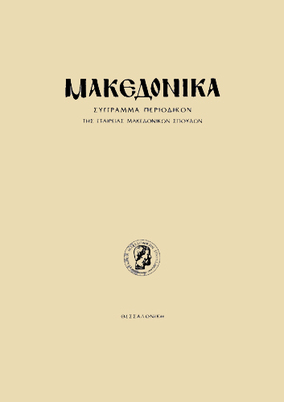Το Μακεδονικό Ζήτημα κατά τις σερβοβουλγαρικές διαπραγματεύσεις στα 1911-1912 για τη σύναψη συνθήκης συμμαχίας
Part of : Μακεδονικά ; Vol.30, 1996, pages 313-325
Issue:
Pages:
313-325
Parallel Title:
The Macedonian Question in the 1911-12 Negotiations for a Serbo-Bulgarian Treaty of Alliance
Section Title:
Articles
Abstract:
The tense atmosphere in the Balkans in 1911 forced Serbia and Bulgaria to start talks about a treaty of alliance. During the negotiations, which lasted from October 1911 to the following March, a solution to the Macedonian Question presented great problems. Bulgaria wanted an autonomous Mace donia, because it intended to annex the region when the time was ripe, as it had annexed Eastern Rumelia in 1885. But Serbia rejected this Bulgarian proposal and sought to have Macedonia divided between their two countries. Eventually, after five months of arduous discussions, the Serbo-Bulgarian treaty of alliance was signed on 29 February/13 March 1912, most brutally violating Greece’s historical and ethnological rights in Thrace and Macedonia. By the terms of the treaty, Serbia recognised Bulgaria’s rights over the ter ritory east of the Strymon and Rhodope, i.e. eastern, Macedonia and Thrace; and Bulgaria recognised Serbia’s rights over the territory north and west of the Skadros mountain range, i.e. the sanjak of Novi Pazar and Old Serbia as far as the Adriatic coast. As for the area in between, i.e. central and western Macedonia and part of the vilayet of Kossovo, if it could not become a separate autonomous province, it would be divided as follows: all of central and much of western Macedonia would be taken by Bulgaria; and the western part of the vilayet of Kossovo, which included the towns of Skopje, Kuma- novo, and Divri, would be regarded as a disputed area, its fate to be determined by the Tsar of Russia as absolute arbiter. This Serbo-Bulgarian treaty of alliance provided only a temporary solu tion to the Macedonian Question. Unable to gain access to the Adriatic, Serbia would subsequently demand additional territory in Macedonia, leading to a rift with its former ally, Bulgaria. Greece sided with Serbia, because, after the end of the First Balkan War, Bulgaria had challenged Greece’s just claims to the Macedonian territory that the Greek army had sacrificed so much to liberate. So the Macedonian Question re-opened in 1913 and conduced to the collapse not only of the Serbo-Bulgarian agreement, but of the whole Balkan alliance that had been achieved with such pains the previous year.
Subject:
Subject (LC):
Notes:
856:https://ejournals.epublishing.ekt.gr/index.php/makedonika/article/view/5810, DOI: https://doi.org/10.12681/makedonika.249
Electronic Resources:




